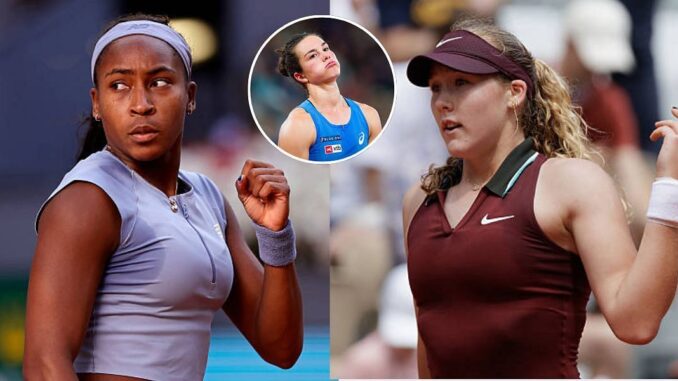
Hours after a dramatic quarterfinal at the 2025 French Open, where Russian prodigy Mirra Andreeva unraveled under the pressure of a boisterous Parisian crowd, world No. 2 Coco Gauff is gearing up for her own battle against home favorite Lois Boisson in the women’s semifinals. Andreeva’s meltdown, marked by a code violation for smashing a ball into the stands and tearful exchanges with the crowd, served as a stark reminder of the unique challenge posed by the Roland Garros atmosphere. Gauff, however, is determined to avoid the same emotional pitfalls, revealing a key mistake she’ll steer clear of as she faces the No. 361-ranked wildcard on Court Philippe-Chatrier. With a strategic mindset and seasoned composure, the 21-year-old American is poised to silence the partisan crowd and end Boisson’s Cinderella run.
Andreeva’s quarterfinal loss to Boisson was a spectacle of raw emotion and crowd-fueled intensity. The 18-year-old, seeded sixth, had been a title contender, having not dropped a set en route to the last eight. Yet, the relentless support for Boisson, with 15,000 fans chanting “Lois, Lois” and erupting at every point, pushed Andreeva to the brink. After squandering two set points in a tense first-set tiebreak, which Boisson won 8-6, Andreeva’s frustration boiled over. A missed volley in the second set led her to fire a ball into the stands, earning a warning and a chorus of boos. “Sometimes I was a bit emotional,” Andreeva admitted post-match. “Today was one of those days when it’s just a bit harder to deal with everything that’s going on in the court.” Her unraveling continued as she argued with the umpire over a disputed call and gestured for her mother to leave her player’s box, ultimately falling 6-3 in the second set.
Gauff, who watched the drama unfold, is no stranger to hostile crowds. Her 6-7(6), 6-4, 6-1 victory over Madison Keys in the quarterfinals marked her fifth consecutive Roland Garros quarterfinal, a feat that places her among the Open Era’s elite. Now, as she prepares to face Boisson, the first Frenchwoman to reach the semifinals since Marion Bartoli in 2011, Gauff is drawing on past experiences to maintain her cool. “I hope everyone will be respectful. If not, it’s cool,” Gauff said, reflecting on the challenge of playing a local favorite. “I can’t get irritated that someone is rooting for their hometown hero, because I would do the same.” Her strategy is clear: avoid letting the crowd’s energy dictate her emotions, a mistake that derailed Andreeva. “I think it’s just something that I will mentally prepare for if it were to happen and expect and be ready for,” she added, emphasizing her plan to stay focused and harness the crowd’s energy without letting it overwhelm her.
Boisson’s journey is nothing short of remarkable. A year ago, a torn ACL forced her to withdraw from Roland Garros, where she had been granted a wildcard. Now, the 22-year-old has surged from obscurity, defeating top players like No. 3 Jessica Pegula and No. 31 Elise Mertens to become the lowest-ranked semifinalist in over 40 years. Her powerful forehand and resilience, symbolized by the word “resilience” tattooed on her arm, have electrified the French crowd. “It was extraordinary to have the crowd supporting me so much,” Boisson said after her win over Andreeva. “Even though sometimes it’s a bit raucous, the crowd is pushing me, and it’s great.” Her dream, she declared, is not just to reach the semifinals but to win the title: “My dream is to win it, not to be in the semifinal.”
Gauff’s path to the semifinals was not without its challenges. Against Keys, she overcame a first-set tiebreak loss and 41 unforced errors, relying on her defensive prowess and a dominant third set where she committed just two errors. “She has a great inside-out and inside-in forehand,” Gauff said of Keys, acknowledging the need to run and punish short balls. Her ability to reset after a shaky start underscores her maturity, a quality she’ll need against Boisson, who thrives on crowd momentum and heavy groundstrokes. Gauff holds a 4-0 head-to-head edge over Andreeva, including a straight-sets win in Rome earlier this year, and her experience on big stages—reaching the 2022 French Open final and winning the 2023 US Open—makes her the favorite.
The semifinal promises a clash of contrasts: Gauff’s seasoned composure against Boisson’s fearless underdog spirit, amplified by a crowd that can turn Chatrier into a cauldron. Gauff’s plan to “pretend they’re cheering for you or just use it and not let it get to you” reflects lessons learned from past encounters with hostile audiences, including Serena Williams’ tearful 2003 loss to Justine Henin. With the other semifinal featuring Aryna Sabalenka and Iga Swiatek, the women’s draw is poised for a thrilling conclusion. Gauff’s ability to stay mentally sharp and avoid Andreeva’s emotional spiral will be key to reaching her second Roland Garros final and cementing her status as a Grand Slam titan.
Leave a Reply